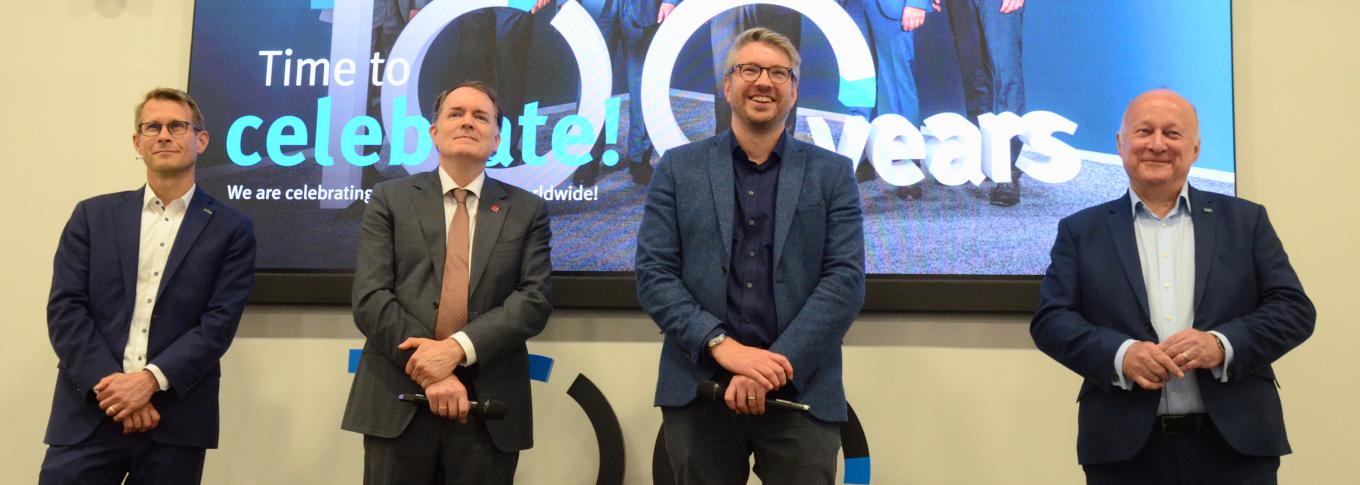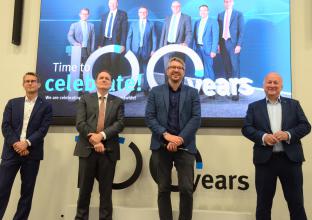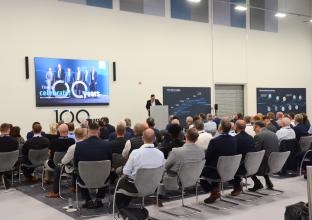
Facing the future
Representatives of UK manufacturing gathered in force in June to mark the centenary of industrial automation specialist Festo. The event, held at Festo GB’s Innovation Centre in Northampton, was an ideal opportunity for industry organisations, customers, suppliers, and employees to discuss how automation will shape British manufacturing in the future.
Guest speakers included John Pearce, CEO, Made in Britain, Ben Blackledge, CEO, Worldskills UK, Professor Mike Wilson, Chief Automation Officer, Manufacturing Technology Centre, and Dr Sebastian Beck, Festo Board Member for Finance and HR. Key themes included the importance of innovation and collaboration, attracting new talent and skills development, and investment in automation in the context of British manufacturing and the global economy.
Stay competitive, stay accountable
Swapnil Khedekar, Head of Operations Festo GB, set the tone for the day. “Today is not just about reminding ourselves where we’ve come from, but to look ahead. We have not reached the finishing line, we are celebrating a milestone on a much longer journey.”
Swapnil then highlighted the values that underpin Festo’s business ethos. “Innovation is the way we stay competitive, sustainability is the way we stay accountable,” he said. Summarising the company’s long-term approach, Swapnil concluded: “As a family company, Festo thinks in generations, not in quarters.”
Responsible manufacturing
John Pearce, CEO, Made in Britain, expanded on the themes of collaboration, innovation and sustainability, explaining the contribution that British manufacturing makes to the national economy.
“At Made in Britain, we bear witness to the passion and resilience of the UK manufacturing sector. Manufacturing companies carrying the coveted British Trademark now contribute around £20 billion to the British economy, which is great news for customers wanting products that are made well and delivered promptly by people you can trust.”
John emphasised the importance of forming robust, local supply chains, particularly in the context of global disruptions. “Making locally, sourcing locally, is responsible manufacturing. It is also common sense in these uncertain times, rather than any rejection of globalisation. Responsible manufacturing protects the future, supports growth, and safeguards resources.”
He concluded: “Festo leads by example. They are successful manufacturers because they have ambition, resilience, longevity, and a strong commitment to the future.”
Developing skills
Securing the future of manufacturing through developing the skills required to implement new automation solutions was addressed by Ben Blackledge, CEO, WorldSkills UK, an organisation delivering skills excellence across the UK, helping young people thrive and employers grow. Ben underlined the chasm between the expectations of a younger, tech-savvy generation and what manufacturers say they need:
“From our research, 63 percent of manufacturers are telling us that young people don’t have the right skills they need to support their businesses, and yet 50 percent of those same manufacturers don’t feel they are able to engage with any educators or skills providers. This disconnect is then compounded by the fact that 83 percent of young people feel they face a significant barrier to pursuing a career in manufacturing.”
Ben sees closer collaboration as the key to resolving the skills gap and securing the future of British manufacturing. He also believes there must be a renewed focus on how skills are taught for the UK to be internationally competitive. “This means embedding world-class standards at the very core of how we train, develop, and empower the next generation. Our partnership with Festo is key to this, and through the WorldSkills UK competition programmes, we are working together to deliver the high-quality skills that employers need to grow .”
Investment in automation
Skills shortages and an aging workforce are challenges that automation can solve, according to Professor Mike Wilson, Chief Automation Officer, Manufacturing Technology Centre. He emphasised the transformative potential of automation as a means to revitalise productivity and stimulate growth, drive innovation and efficiency, and encourage a more dynamic and progressive approach to change.
“We must invest in more automation if we want to retain our competitive edge,” he told the audience. “Britain is still the world’s 12th largest economy, but we only average 119 robots per 10,000 employees. We must treble this figure just to stand still, let alone catch up with countries like the U.S. and Denmark. If we matched the levels of automation that exist in our competing countries, we could increase UK productivity by 22 percent.”
According to Professor Wilson, ease of use and deployment – through cobots, visualisation tools, software and out-of-box solutions – is already encouraging greater deployment of automation, particularly among SMEs. Machine learning and AI will be key to making automation adoption even simpler in future.
He urged the audience: “Give staff the tools to do their job efficiently – sweat the assets, not the people. Thanks to companies like Festo, we have the technology. The banks are willing to provide finance and we have support via 100 percent capital allowance and R&D tax credits.”
The future of automation
Festo’s Dr Sebastian Beck then explained how the company’s original motto, “one mission, many hands”, had set the foundation for a business based on teamwork and collaboration. He traced Festo’s early interest in internationalisation and enthusiasm for technology that resulted in the development of many unique automation solutions, from a semi-automated cylinder-valve combination in 1955, through to modern valve terminals, electric automation and the adoption of piezo technology to improve energy efficiency. He then announced that Festo is close to launching its next innovation, an open architecture automation platform.
Concluding the day, Swapnil Khedekar said: “Festo is focused on making customers’ lives easier. We continue to develop automation solutions that are sustainable, energy efficient and reduce time to market. We remain committed to getting closer to our customers through investment in local manufacturing facilities, collaborative, partnership working, and encouraging lifelong learning - this is what moves us forward.”
About Festo
Festo is a leading international supplier of automation technology with a turnover in 2024 of around €3.45 billion. Festo employs over 20,000 people worldwide and is a proven innovator and problem solver in pneumatic and electrical automation, where it is the performance leader. Festo offers around 36,000 pneumatic and electric products in hundreds of thousands of variants for factory and process automation technology, many of which can be tailored to specific customer needs. Sustainability, reducing its CO2 footprint, digital learning, innovation, performance and speed are the key drivers for the company's future. Festo GB operates as a carbon neutral organisation and uses the PAS 2060 standard externally audited by NQA to validate this claim to customers, employees and other stakeholders.
Festo Industrial Automation's innovative strength is demonstrated through the launch of around 100 new products every year. The company invests over 8.5% of its turnover in R&D, resulting in over 2,600 patents held worldwide. For more information about the company's products and UK / Irish services, please visit: www.festo.com/gb and www.festo.com/ie
Festo and Industry 4.0 - Festo has engaged with the Industry 4.0 initiative from its inception: as a user, manufacturer and trainer. As a member of the steering group, the company has taken an active role in defining the core standards such as the RAMI model and the Administration Shell. Festo Didactic has installed Industry 4.0 Cyber-Physical Factory training hardware systems in many leading universities and training centres. It also provides Industry 4.0 training courses for change managers and practical workshops for employees. Industry 4.0 technologies such as OPC-UA communications are embedded in the latest generation products. For more information, go to www.festo.com/digitalisation
Festo Didactic training delivers training for industry – by industry. Combining Festo's industrial heritage with its future-focused manufacturing and engineering expertise to deliver courses for greater productivity and competitiveness. Offering a wide range of open courses, structured development programmes and tailor-made, customer-specific projects on technology and Industry 4.0 and the industry-leading online training suite, Festo LX. Festo also provides state-of-the-art training equipment solutions for industrial companies and educational institutions around the world. Festo Didactic has around 56,000 education customers worldwide. More information on Festo training and consulting services can be found at: www.festo.com/didactic
Festo Bionic Learning Network encapsulates the innovative nature of Festo, raising awareness and attracting talent to the company. Exploring the links between nature and technology opens new areas of innovation and demonstrates complex ideas in a stimulating and enjoyable way. Festo works with an alliance of internal R&D, external educational establishments and specialist companies to advance bionic solutions for automation applications of the future. The objective is to benefit from bionics as a source of inspiration and to realise these in industrial automation. For more information about Festo's Bionic Learning Network, please visit: www.festo.com/bionics


